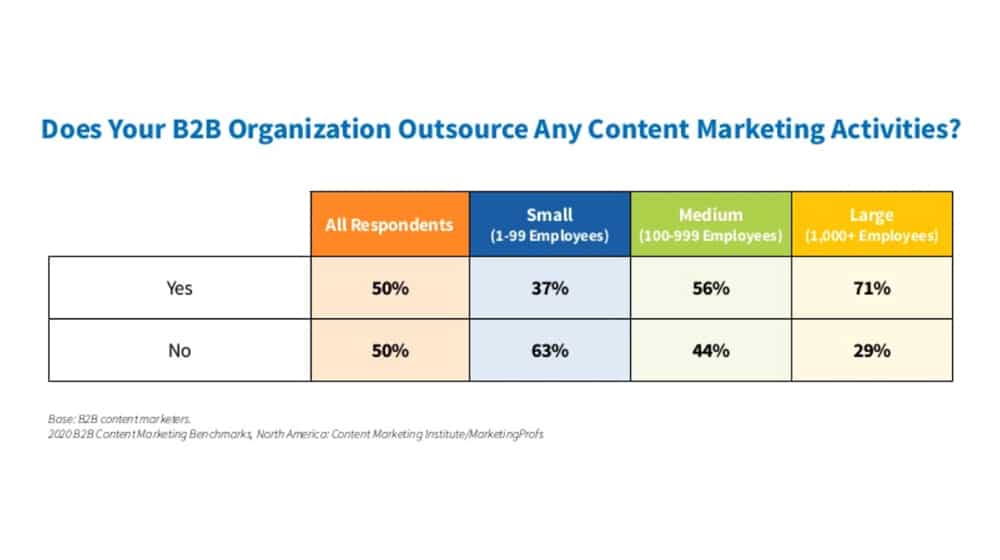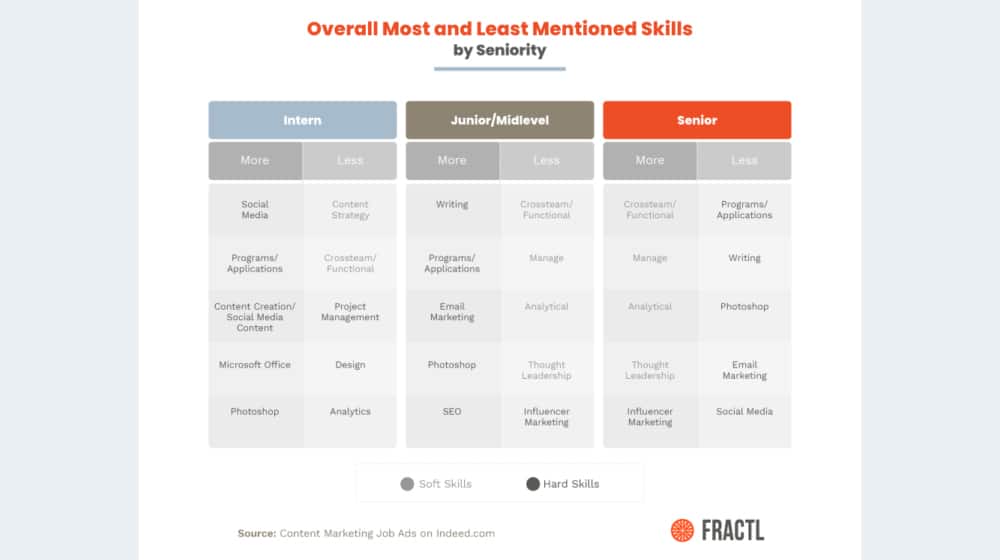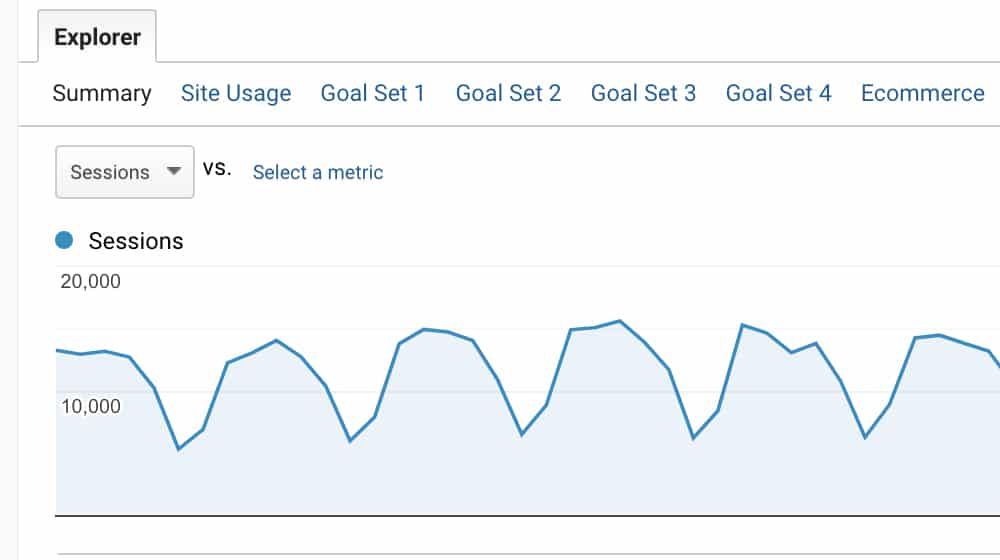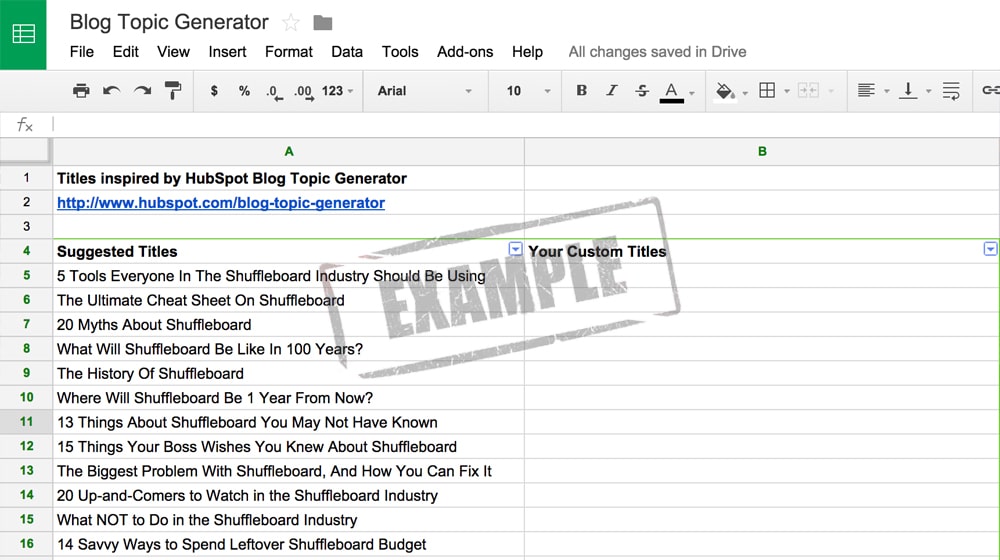How to Train a New Hire to Write Quality Blog Posts for You

Content marketing is nothing new, but every year it gets more and more important. I was writing half a decade ago about how important it is, and it's only gotten more important since. It's like a runaway chemical reaction, growing upon itself and compounding with every passing day. These days, if you don't have a blog, you might as well be invisible.
What's interesting to me is not that content marketing is on the rise, it's that content marketing is getting better. It's maturing, as a marketing strategy and as a discipline. You're no longer competing against sites that don't do any content marketing; you're competing against other content marketers, with varying levels of finesse.
This is what the data shows, in the annual study performed by the Content Marketing Institute.
- More and more companies are defining and documenting their content strategy, rather than simply throwing content out there and hoping it sticks.
- 71% of large companies and 56% of medium companies outsource at least some of their content marketing.
- 50% of content marketing efforts are focused at the top of the funnel – awareness, primarily.
It's no surprise that content marketing is a pressing concern for many companies.

If you're interested in the subject, you're probably interested in someone to write for you, whether they're a new hire, an existing writer, a freelancer, or a contractor.
 30 Second Summary
30 Second Summary
Content marketing grows more critical each year, evolving and maturing as a strategy. Today's competition lies in the finesse of other content marketers. More businesses are strategically planning their content, with 71% of large and 56% of medium companies outsourcing some of their content marketing. If you need a writer for your blog, there are various options, including hiring internally, employing a blog writer, consulting a web-based contractor, securing a high-profile writer, or training a novice. A blog writer must understand the difference between regular writing and content marketing, which largely focuses on writing with a purpose. Training a new writer involves sharing your audience, company, and ideology insights and granting them content examples to emulate. Finally, content marketing often requires a team effort, making outsourcing and prioritizing quality viable approaches.
Tempering Expectations
The first thing you need to recognize is that content marketing is a long game. You're not going to hire a new writer, publish their first post or two, and see an immediate jump in profits. In fact, for a long time, your content marketing is likely going to be a loss leader.

You have to spend money to make money, though, right?
Depending on the kind of writer you pick up, they may already be a talented and seasoned writer, or they might be fresh out of school. They might have spent some time in the content mills, or maybe they've built up a list of their own clients but are looking to move on to a more official, full-time role. In some cases, they might be great, experienced writers, but those are harder to snag. After all, most of them are happy where they are already.
Where to Find Your Writer
You have a handful of different options when it comes to hiring a writer to write blog posts for you. They have their own pros and cons, and there's no right answer for which one you should choose, other than the one that works for you.

An employee who knows how to write is the first option, and it's one that many companies look for. They'll do something like post an internal job opportunity for people who, say, went to school and got a degree in English, but ended up falling into a sales or support role instead. These people know their way around the written word, and they'll be easier to train than some of the other options.
- Pro: They know how to write well enough that you won't be correcting typos constantly.
- Pro: As an existing employee, they already know your product and branding quite well.
- Pro: As an internal hire, you already have a salary and benefits package negotiated that can carry over.
- Con: They may know how to write, but blog writing is a very different kind of writing.
- Con: They'll probably want a pay raise, so they're likely going to be more expensive than an external hire.
- Con: If they don't work out, it's awkward to decide whether to fire them, demote them, or keep training them and hope for the best.
A writer you hire to blog for you is the option a lot of companies turn to when they don't think they have an internal hire they can promote into a blogging position. There are thousands of writers out there toiling away, whether it's at their own fiction projects, personal blogs, or contract work.
- Pro: They tend to be pretty cheap, as the bar is pretty low for freelance writing work.
- Pro: As independently motivated writers, they'll be easier to train.
- Pro: Depending on their origin, they may already know their way around business blogging.
- Con: Many such writers might not want to limit themselves to working solely with one company, and will keep other clients on the side, dividing their attention.
- Con: Writers aren't very good at marketing themselves, so they may be a bit harder to find.
A contractor you find on the web is a great option because these people already know how to blog for content marketing purposes. They're already professionals, so a lot of the initial training work is already done for you.
- Pro: They already know what they're doing.
- Pro: They may be able to take over more than just writing, and can handle blog management as well.
- Con: They tend to be more expensive, because of their experience and that they tend to know what they're worth.
- Con: They're more likely to be working with multiple clients, or be willing to jump ship if a better offer comes along.
A high-profile writer you contract is an excellent option. Picking up someone like Kristi Hines, for example, means you're getting years of excellent experience and high-quality writing when you hire them.
- Pro: They're very good at what they do.
- Con: They charge a price appropriate to their skill level.
- Con: They have their own businesses and client lists, so you're not going to get them to run your whole blog without serious investment.
Training someone completely new to writing web content is also a possible option. Someone new to writing will have a lot to learn before they can catch up to people who have been working in the industry for a decade already, but you can tailor them specifically to your business.
- Pro: You can customize their skillset and training to your exact desires and needs.
- Con: You need to put a significant investment into them before you can even begin to see returns.
There's some overlap between categories as well, of course, so it really comes down to finding and interviewing individuals, knowing what kind of skill level you need, and being able to train them the rest of the way.
Writer Versus Blog Writer
One of the biggest minefields in content marketing is the fact that a lot of writers who don't know any better – and indeed, a lot of non-writers who don't know any better – think that all writing is the same. "It's just writing blog posts, how hard can it be?"
Trust me: it's difficult. It's also one of the most over-simplified internet marketing methods.

Content marketing is a specific skill set that combines writing for the web with a sort of non-sales sales writing. It's not even just blogging, it's blogging with a purpose. People who are used to writing fiction, or books, or academic papers, are going to have a very different skill set.
If you're looking to hire someone with writing experience, you should evaluate how well they fit with content marketing as a skill set. Evaluate their writing, and look for the signals that make that writing good for marketing.
- A good content marketer makes you feel like they know what they're talking about, even if you have no idea who they are. They lend credence and authority to the things they write. They don't waffle, they don't hedge; they know what they're talking about and they give you that information clearly and concisely.
- A content marketer has deep, intimate knowledge of their industry and niche. There are a lot of subtle signs of this. For example, knowing when and when not to define an acronym is a signal. You either need to hire a writer with experience in your industry, or take the time to train one to gain that experience over time.
- A blog post has a purpose. That purpose might be awareness or education. It might be an overt call to action, like "hire Content Powered to manage your blog for you." It might be a subliminal call to action, like how merely by reading this on Content Powered, you're becoming aware of my knowledge of the industry and you're trusting me more to know what I'm doing if you were to, say, hire me to manage your blog for you. Content marketing writing has a purpose in every post.
- The headline and the intro paragraph are the hooks that catch the eye of a potential reader and convince them to read. A good content marketer puts as much effort into the first 100 words of a post as they do the next thousand. Alright, that's a bit of exaggeration, but it needs extra emphasis.
- Blog writing (and web writing in general) needs to have a flow. A logical progression from A to B to C, with the supporting structures of subheadings, bulleted lists, images, and other elements adding weight. Knowing how to formulate a post is a skill that takes years to develop.
All of this can be learned and trained, it just takes time. You can spend less time on training by increasing your salary expenditure to attract a more experienced blogger, but that might not be the ideal option for your business.
We create blog content that converts - not just for ourselves, but for our clients, too.
We pick blog topics like hedge funds pick stocks. Then, we create articles that are 10x better to earn the top spot.
Content marketing has two ingredients - content and marketing. We've earned our black belts in both.

After all, a blog is going to take months or even years before it starts showing valuable returns, and even a high profile writer isn't going to change that too much. We wrote a great post on what to expect and how long blogging takes to start getting traffic here.
How to Train a New Writer
For this part, I'm assuming that you're hiring someone who knows how to write, and possibly knows how to write for the web, but might not be experienced in content marketing specifically and is definitely not intimately familiar with your industry. When I hire a writer, here's how I train them.

1. Make it clear who they're writing for. I don't mean your company here, I mean your audience. Who are the people they're targeting with their content? Remember up above, I mentioned that every blog post needs to have a purpose. That purpose is in part defined by who the post is meant to reach.
What do you need to tell your writer? Things like demographics are important, but they can be broad enough that it might not matter. Geographic location is good, to allow for regional colloquialisms where possible. Experience level is important as well; knowing when to define a term or dive headlong into advanced techniques is crucial.
2. Teach them about your company, product, and ideology. Writers inject some portion of themselves and their perspectives into everything they write. Some of it is intentional, but a lot is simply due to how their perspectives inform their writing.
To that end, you want to rope them into discussions about your company, your product, and most importantly, your ideology. Even if that ideology is near-trivial tribalism like "west coast best coast" or support for particular sports teams, it injects flavor and background.
3. Provide them with plenty of examples of content to emulate. Compile examples of everything you want your blog writer to write for you. Examples of writing that showcases voice and style. Examples that show off formatting, image distribution, and vocabulary. Examples of topics you want to be covered in your blog, and the kind of coverage – in depth, breadth, and attitude – you want.

4. Work out a level of responsibility they're comfortable with. Are you hiring a writer, or a blog manager, or a content marketer? Each level of these roles have different expectations. A writer just writes content, which is important, but it's not everything. A blog manager might also handle your topic ideation, metadata and SEO optimization, graphic design, community management, plugin management, conversion optimization, and other elements of running a blog. Content marketers do all of that and more, guiding the overall direction of the blog and monitoring on-going and historical analytics and rankings to make sure it's working. Writing an article is one thing, but this is where most businesses fall flat.
Figure out what the distribution of duties is going to be, between you and your content marketing team. Keep in mind that blogging takes time, and you don't want to overload your marketer.
5. Teach them about topic ideation. Topic ideation is one of the most difficult aspects of content marketing. Coming up with something new to write about every week for years really takes a toll. Making sure those topics attract visitors, lead into a further call to action, and be evergreen enough to be relevant down the road makes it even harder.
Now, if you're just hiring someone to write for you, you can handle all of that. If you want them to be more of a blog manager or content marketer, guiding the direction of the blog, then you'll want to teach them. You'll also want to provide them with tools to help, whether it's keyword planners, trend monitors, competitive analysis tools, or whatever else.

6. Edit their work and keep them in the loop. Writers don't grow and succeed in a vacuum. They need feedback. However, writers are also notoriously sensitive to feedback that is unduly harsh or less than useful. Knowing how to give feedback is a skill all of its own. Thankfully, it's not too difficult to learn.
On a technical level, you can use tools like Grammarly, or a paid editor, to edit the content your writer gives you. Look for issues and errors they consistently make and point those out to them. They can adjust, learn, and stop making those mistakes.
On a more macro level, look for issues in composition, voice, and flow. Bring them up with the writer, and offer solutions to the problem. Make sure to discuss it with them, rather than just issue directives. The more picky little things you want them to keep in mind, like specific word choices or phrases to use or avoid, the more cognitive load it is to write a post. It can become habit eventually, but honestly, it's also rarely going to be worthwhile to enforce.
7. Establish a process. Especially early on, and doubly so if your writer is managing topic ideation, consider establishing a process where the writer submits a pitch or outline prior to investing the time in writing. It takes a long time to write a really good blog post, so wasting effort on a pitch that is thrown out or an outline that is dramatically changed is a loss of investment. Eventually, you'll reach a point where you trust your content marketer enough to let them do their own thing, but a process can help a lot from the start.
Wrapping Up
Blogging is a lot of work. Writing is a ton of work, and adding on all of the blog management and overall content marketing just makes it worse. Honestly, I'm consistently impressed by people who do it all themselves and pull it off. I personally feel like it should take a team of 3-5 people to run a blog successfully. A writer, a graphic designer, and someone who guides the marketing and day-to-day operation of the blog is the bare minimum team I would usually consider.
Training this team is a long-term project, and it can fall apart if one member of that team leaves. Hiring people who are already experts is a great option, but will tend to cost more. Outsourcing the whole thing is often a good compromise, though at times this can lose that personal touch if there isn't any focus on making your articles engaging and interesting to read.
Which method you choose to pursue, that's entirely up to you. Just don't fall for the trap of valuing quantity over quality. This alone will put your content marketing campaign a full head and shoulders above your competition.
Are you thinking of hiring a blog manager? Do you have any questions for us before you start? Let us know in the comments section and we'll reply quickly!



 30 Second Summary
30 Second Summary


October 26, 2020 at 8:14 am
Is it worth it to get a blog manager or just hire a writer and manage the blog by myself?
October 26, 2020 at 8:32 pm
Hey Benjamin! Optimizing your posts is generally where most businesses go wrong. For example, if links aren't ed appropriately, you could give Google the wrong idea that you're linking to low-quality or penalized sites intentionally and it could hurt your performance. Or, you could be accidentally formatting the posts wrong, not using enough images, not using the right plugins, using too many plugins and slowing your site down, or otherwise somehow neglecting the performance of your site and your articles.
Writing the articles is half the battle, and managing the blog and optimizing your posts is the other half. It's very rare that you can find someone competent that can do both, but if you can fill a pair of these shoes adequately, I don't see any harm in hiring someone to help with the other half.
Hiring a company to help is tricky as well - it's tough to find someone who isn't going to cut corners. Most people won't know the difference if they are cutting corners, so it's a bit like hiring a plumber. They may fix your leak, but very few people pop the hood to find out if they just put duct tape over the leak.
January 18, 2021 at 4:29 am
My biggest barrier has been typing speed. I've tried training some of my employees to write articles in their free time, but it can take them up to a week or longer just to write one article. Is that unusually long? Any tips on how to help them write these more efficiently?
January 22, 2021 at 9:57 pm
Hi Beth!
We wrote some great tips on this here that you might find interesting:
https://www.contentpowered.com/blog/how-long-write-blog/
The average time is anywhere between 3 and 6 hours, though this can vary quite a bit.
If they are also editing the article, doing keyword research and topic ideation, and creating images, it will add some time to those final numbers.
I find it helps if you give the writer a basic outline of what you want the article to be about.
You can provide sources for inspiration, the headings in an outline, the points you want to cover, and the general flow and direction of the article.
This helps cut down on the time it will take them to write the article, and the end product will be closer to what you're looking for because you communicated the direction and outline to your writer.
I hope this helps!
July 24, 2021 at 3:48 am
This is so helpful! Glad I read this
July 24, 2021 at 4:26 pm
Thanks Ainah!
September 28, 2021 at 5:26 am
Hey James. I was just wondering if you also have an idea of how much they charge? Are they charging monthly or per article? Also, how do you interview them? Any tips?
September 28, 2021 at 4:41 pm
Hey Margaret!
That all depends on you; if you want to hire per article or pay monthly, what your content demand looks like, how efficiently the writer works, the quality they can put out with the allotted budget, etc.
As far as interviewing, I wrote a couple of good guides on that process here:
https://www.contentpowered.com/blog/test-writer-job-candidates/
https://www.contentpowered.com/blog/questions-content-marketer-interview/
Good luck!